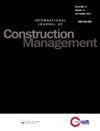可持续住宅项目价值管理实施障碍的多准则评价与平稳分析
IF 3.4
Q2 CONSTRUCTION & BUILDING TECHNOLOGY
International Journal of Construction Management
Pub Date : 2023-10-19
DOI:10.1080/15623599.2023.2267870
引用次数: 1
摘要
在过去的20年里,价值管理(VM)已经成为一种成熟的技术,而在欠发达国家;非正式方法用于vm相关的活动。本研究旨在探讨虚拟机部署的障碍。这些障碍可分为环境和文化、车间动态、知识和利益相关者以及标准化。对先前的研究进行了回顾,以确定这些障碍,并通过半结构化访谈进一步分类。通过与建筑专家的335次结构化调查,确定了这些障碍的重要性。然后采用模糊综合评价和加权总和积评价技术,通过与理想解方法的相似度对四类壁垒进行优选排序。此外,还采用平稳方法对虚拟机屏障在住宅项目中的应用进行了评价。根据调查结果,阻碍虚拟机广泛使用的最重要的障碍是知识和利益相关者。在这些类别中,限制虚拟机实现的最具影响力的障碍是研讨会决策者参与问题。本研究通过帮助住宅建筑行业的利益相关者了解虚拟机障碍并利用它们来提高项目价值,为发展中国家有效采用虚拟机提供了路线图。关键词:价值管理实施障碍住宅建筑项目多标准评价平稳分析披露声明作者未报告潜在利益冲突。数据可用性声明数据可根据要求提供。本研究由萨塔姆·本·阿卜杜勒阿齐兹王子大学项目号(PSAU/2023/R/1445)资助。本文章由计算机程序翻译,如有差异,请以英文原文为准。
A multi-criteria evaluation and stationary analysis of value management implementation barriers for sustainable residential building projects
AbstractOver the past 20 years, value management (VM) has become a well-established technique, while in underdeveloped countries; informal methods are used for VM-related activities. This study aims to examine the barriers to VM deployment. These barriers are categorized into environment and culture, workshop dynamics, knowledge and stakeholders and standardization. A review of prior research is conducted to identify these barriers, which are further categorized through a semi-structured interview. The significance of these barriers is determined through 335 structured surveys with building specialists. The four categories of barriers are then assessed using fuzzy synthetic evaluation and weighted aggregated sum product assessment—technique for order of preference by similarity to ideal solution methods. In addition, a stationary method is used to evaluate the incorporation of VM barriers into residential projects. According to the findings, the most significant category of barriers that hinder the widespread use of VM is knowledge and stakeholders. Among these categories, the most influential barriers that constrain the VM implementation are workshop decision-maker participation issues. This research provides a roadmap for effective VM adoption in developing countries by helping stakeholders in the residential building industry understand VM barriers and leverage them to enhance the value of their projects.Keywords: Value managementimplementation barriersresidential building projectsMulti-Criteria evaluationstationary analysis Disclosure statementNo potential conflict of interest was reported by the author(s).Data availability statementThe data will be available upon request.Additional informationFundingThis study was supported via funding from Prince Sattam bin Abdulaziz University project number (PSAU/2023/R/1445).
求助全文
通过发布文献求助,成功后即可免费获取论文全文。
去求助
来源期刊

International Journal of Construction Management
MANAGEMENT-
CiteScore
8.60
自引率
17.90%
发文量
112
期刊介绍:
The International Journal of Construction Management publishes quality papers aiming to advance the knowledge of construction management. The Journal is devoted to the publication of original research including, but not limited to the following: Sustainable Construction (Green building; Carbon emission; Waste management; Energy saving) Construction life cycle management Construction informatics (Building information modelling; Information communication technology; Virtual design and construction) Smart construction (Robotics; Artificial intelligence; 3D printing) Big data for construction Legal issues in construction Public policies for construction Building and Infrastructures Health, safety and well-being in construction Risk management in construction Disaster management and resilience Construction procurement Construction management education
 求助内容:
求助内容: 应助结果提醒方式:
应助结果提醒方式:


